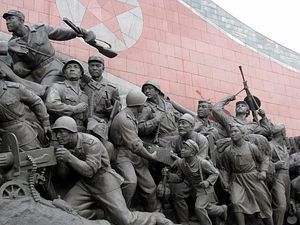The end of the Cold War led to the largest military demobilization since the final days of World War II. Between 1988 and 1999, the Soviet Union alone reduced its military personnel by about three million men (although some of these found employment in the armed forces of successor states). The rest of the Eastern bloc went through a similar experience, followed by the NATO alliance.
This demobilization left a massive, floating population of trained soldiers, often without any good economic prospects. This pool of military labor helped feed the growth of private military firms, operating in Africa, the Middle East, and elsewhere. In some cases, Russian and Eastern European soldiers served on different sides of the same conflicts, often bringing equipment along with them.
Given the changing nature of military technology, it is unlikely that we’ll ever see a global military demobilization of similar magnitude. Mass armies have gone out of style, except for in one place: the Korean Peninsula.
Over the past few years, Western and Korean scholars and analysts have studied the difficulties presented by a collapse of North Korea. Long story short, a North Korea in collapse poses nearly as many difficulties as the existing Pyongyang regime. In the very short term, the fact that the DPRK employs a hugely disproportionate amount of its population in the military services is a boon for any successor coalition; in the wake of what happened in Iraq, it is unlikely that anyone will make the mistake of releasing this group of potentially angry young men from their service requirements.
In the longer term, however, a unified Korea cannot plausibly maintain armed forces on a scale of the Korean People’s Army, much less the combination of the KPA and the Army of the Republic of Korea. This means that, sooner or later, the successor government will need to discharge a huge quantity of trained, military-age males into the general workforce. As robust as it is, the Korean economy will struggle to absorb this workforce.
This could result in a dynamic not unlike what happened after 1991, in which hundreds of thousands of soldiers try to find employment in military-related fields. Just as the collapse of the Soviet Union led to a boom in the supply of personnel to private military firms, a North Korean collapse could lead to thousands of former North Korean soldiers finding jobs in conflict zones around the world. Perhaps worse, North Korea maintains stores of weapons that rival (to scale) those possessed by the Soviet Union in 1992. These weapons could also find their way to conflict zones, perhaps in the hands of their former operators.
And so along with the many other problems posed by Korean unification, the international community needs to approach the question of demobilizing the KPA with great care. Right now, the soldiers of the KPA pose a critical security threat to South Korea. After unification, they may pose a threat to the world.

































